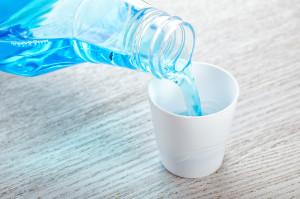 Any dental hygiene care is a good thing for your dental hygiene. As much as any dentist would love that to be an axiom, it’s just not true. Here are the potential problems with using mouthwash and recommendations to make oral rinsing an always good thing.
Any dental hygiene care is a good thing for your dental hygiene. As much as any dentist would love that to be an axiom, it’s just not true. Here are the potential problems with using mouthwash and recommendations to make oral rinsing an always good thing.
No substitute
A healthy heart, fresh breath, zero food particles stuck in your teeth … so many benefits to good dental hygiene—yet humans still see it as “a chore.” So, when a person feels that rinsing with mouthwash is “almost as good as brushing” (please don’t believe it’s as good as brushing), it becomes easier and easier to substitute brushing with rinsing. Kids are even more susceptible to this line of reasoning, and that can be dentally disastrous.
Keep in mind that most mouthwashes are alcohol-based. And that’s a good thing when you need a little extra help treating gum disease and/or tooth decay. It helps maintain fresher breath by killing off the bacteria that cause it, and it can help keep gum tissue a little cleaner overall. But when your mouth is generally healthy, the alcohol can work against you. That’s because alcohol kills off the good bacteria in your mouth too. And some of that good bacteria—irony alert—actually helps fight bad breath.
Label libel
Mouthwashes often add ingredients that make us feel better about the product, especially when fun and fancy graphic design catches our eye. Fluoride! That makes teeth stronger, right? Essential oils! What could go wrong?
Well, a lot can go wrong because there are a lot of other ingredients: peroxide, chlorhexidine gluconate, triclosan, thymol, cetylpyridinium chloride, the list goes on. They all serve a purpose and in moderation—or at minimum—are generally safe for your teeth. When used excessively, they harm your teeth and can stain them too.
Molar of the story? Don’t get wooed by labels. Fall in love with flossing and brushing instead.
Time is of the essence
If you think rinsing with mouthwash is saving you time, think again. In your busy schedule you decide to save 1 minute and 30 seconds by rinsing for 30 seconds rather than brushing for 2 minutes. Well, guess what! The ingredients in mouthwash need time to activate, at least 1 minute. So you’re not saving a 90 seconds, you’re wasting 30 of them.
Although the “chore” of flossing and brushing may seem to break your momentum from getting to shower to closet to car to cubicle on time, it’s just a few minutes added to your routine. Set your alarm 5 minutes earlier, hit the snooze button one less time. You’ll prevent a lot of bad breath, gum disease, and tooth decay. And those are things that can cause even more delay in your day.
If you must
In situations where mouthwash can be beneficial, we suggest using alcohol-free mouthwash. Some studies have shown a correlation between alcohol and oral cancer. However, the data shows it’s more prevalent in people who use nicotine products. Nonetheless, why up the odds?
Something you must not do is let young children (6 and under) use mouthwash. There is virtually no benefit and all risk for them. And if the mouthwash contains alcohol, it will dissolve the mucus layer of the mouth over time, leaving teeth vulnerable to over-sensitivity. Children also aren’t the best garglers on the planet, so they end up swallowing a lot of the liquid. Scope shots anyone? Not a good idea for junior.
We hope we’ve alleviated any unnecessary fear of mouthwash, but even more so we hope we’ve alleviated the need to use it. Proper brushing and flossing and regular dental cleanings will do anything and everything mouthwash could ever do, sans the bad stuff. In the meantime, if you purchase mouthwash, look for the American Dental Association’s Seal of Acceptance. It’s not hard to find, because if a brand of mouthwash has earned it, the graphic designer will usually make it loud and clear.







Leave a Reply